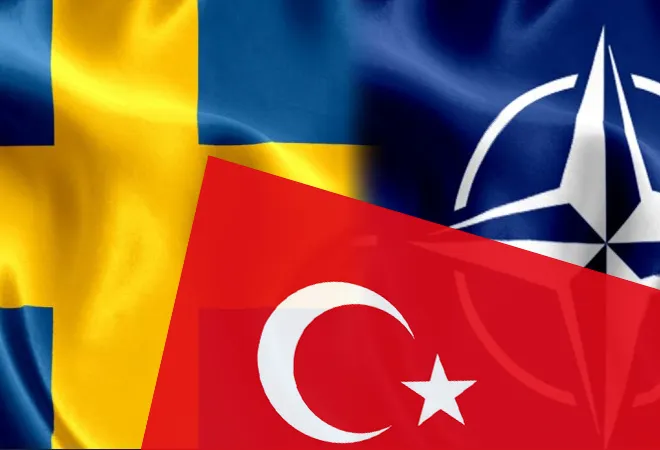-
CENTRES
Progammes & Centres
Location
Sweden’s NATO bid hangs in the air as Türkiye stalls the ratification of the accession bid

Sweden, Finland, and Türkiye held a second round of trilateral talks on NATO accession of the Nordic countries in Brussels on 9 March 2023. While talks ended without any concrete outcomes, Türkiye acknowledged that Sweden and Finland have taken several steps to meet its concerns, but not enough for Ankara’s ratification of their NATO bid. However, they agreed to hold further meetings. In January 2023, Turkiye suspended the trilateral talks due to protests near the Turkish Embassy in Stockholm during which a copy of the Quran was burnt by a far-right politician. This article provides a background to the accession process of the two Nordic countries, the progress made, and the concerns raised by Türkiye.
Sweden’s NATO bid
The Ukraine Crisis has led to a strategic security re-evaluation among the neutral countries within the European continent. This was most visible when Sweden and Finland let go of their respective neutrality and opted to become members of NATO. While Iceland, Denmark, and Norway have been part of the Alliance since 1949, Sweden and Finland had chosen to remain neutral. It needs to be noted that while they were officially not a part of the Alliance, they have been active partners in EU’s security initiatives and given the dynamics within the region, they developed a policy of “territorial defence based on conscription and high levels of defence spending.” Following the crisis, the prime ministers of both countries, in their meeting in April 2022, reiterated that “Russia’s invasion of Ukraine had changed Europe’s whole security landscape and dramatically shaped mindsets in the Nordic countries” and formally applied to join NATO in May 2022.
While Iceland, Denmark, and Norway have been part of the Alliance since 1949, Sweden and Finland had chosen to remain neutral.
However, their accession bid was opposed by Türkiye on the grounds that both the Nordic countries stop supporting Kurdish armed groups, such as the Kurdistan Workers’ Party (PKK), and lift their bans on the sale of arms to Ankara. To overcome these divisions, the three countries signed a MoU on 28 June 2022. Under this Sweden and Finland agreed on three critical issues: “first, extend their support to Türkiye against threats to its national security. To that effect, Finland and Sweden will not provide support to People’s Defense Units/Democratic Union Party (YPG/PYD), and the organisation described as Fethullah Gülen movement (FETO) in Türkiye, and confirm Kurdish Worker’s Party (PKK) is a proscribed terrorist organisation; second, address Türkiye’s pending deportation or extradition requests of terror suspects expeditiously and thoroughly; and third, confirm that now there are no national arms embargoes in place between them”. With the signing of the MoU, Turkiye withdrew its opposition to the membership application of the Nordic countries, paving way for NATO to formally invite them to join the Alliance.
Despite the agreement reached in June 2022, the ratification of the accession bid is still pending with Türkiye. The following section analyses some of the key concerns of Türkiye.
Turkish concerns
The majority of Turkish concerns stem from what it views as Swedish and Finnish support and its role as a safe haven for networks and organisations it has deemed as terrorist groups, such as PKK. In the past, Sweden has taken a substantial number of Kurdish refugees, which Türkiye has seen as providing a base and financing for anti-Turkish activities, which has been denied by the Swedish authorities. The PKK has been designated a terrorist organisation by the EU and the US. Another issue that Türkiye has raised is the arms embargo which was placed on the country in 2019 after its actions in Syria. While the three countries reached an understanding in June 2022 resulting in the lifting of the arms blockade, however, on the other aspects, Ankara has been pushing for additional concessions including the extradition of 130 ‘terrorists’ to Türkiye. For Finland, Turkish concerns are more by association as Helsinki hosts a very small Kurdish population. The concerns were largely due to its joining the EU countries in imposing the arms embargo on Ankara.
In the past, Sweden has taken a substantial number of Kurdish refugees, which Türkiye has seen as providing a base and financing for anti-Turkish activities, which has been denied by the Swedish authorities.
Both Sweden and Finland have worked towards following through with the trilateral MoU, and committing themselves “to prevent activities of the PKK and all other terrorist organisations, as well as activities by individuals in affiliated and inspired groups or networks”. Sweden’s Parliament passed constitutional amendments in November 2022 which would make it possible to “introduce new laws to limit freedom of association when it comes to associations that engage in or support terrorism” and will further tighten the laws to ban activities linked to Kurdish groups. Swedish Prime Minister Ulf Kristersson has described the proposed law as a critical step in ‘fulfilling its commitments under the trilateral agreement. While Türkiye has said that it takes into account the steps taken, however, it is going to be a long road before the ratification of the Swedish application is done by Ankara. For its part, Sweden has said that it has done whatever was legally possible and that Türkiye is making demands that Sweden cannot accept.
Turkish opposition to NATO’s enlargement has also led to questions related to Ankara’s own standing within the alliance. Ankara has the second-largest army in NATO and a geographical position between Europe and Asia which makes it a critical partner—but a member whose interests do not necessarily align with the members. This has been visible in its response to the Ukraine Crisis where President Erdogen emerged to be one of the few leaders who have kept an open line of communication with both Moscow and Kiev. Türkiye also played an important role in brokering the grain deal between the two countries. However, it has deviated from the alliance’s position by not implementing sanctions on Russia and has continued its bilateral relations with Moscow. At the same time, it has also sold critical weapons such as drones to Ukraine along with condemning the conflict and closing the Black Sea route, thereby, carefully balancing its position.
What next?
Despite an optimistic beginning, a fast-track accession process of Sweden and Finland has turned out to be a foregone conclusion. Nine months down the line, their bid is yet to be ratified by Hungary and Türkiye. While Budapest has signaled support for ratification of the application, Ankara has, so far, refused to do so. As the accession process requires all members of the Alliance to approve the new members, the tensions between Sweden and Türkiye threatens to derail the entire process, along with the accession of Finland, whose bid is attached with that of Stockholm.
While Budapest has signaled support for ratification of the application, Ankara has, so far, refused to do so.
While Ankara had earlier suggested that it can process Finland’s application separately, however, this was rejected by both the Nordic countries and NATO’s Secretary General. However, in the past month, Finland has also been contemplating going ahead alone in the process. Even the public opinion in Finland is supportive of Helsinki moving ahead with its bid alone—53 percent in favour that Finland’s application should not depend on the Swedish timeline and only 28 percent favouring going ‘hand in hand’. Its parliament on 1 March 2023 passed the NATO bill with an overwhelming majority, pushing Helsinki one step closer to the membership. The ratification of Finland’s application was given a go-ahead by the Turkish President on 17 March 2023, paving the way for Helsinki to join the alliance ahead of Stockholm. The process is expected to be completed before elections in Türkiye in May 2023.
When it comes to the membership of Sweden, Türkiye’s opposition rests on very complex reasons ranging from arms embargo but more importantly on Swedish support to what it considers as terrorists groups. Moreover, the far-right demonstrations in front of Turkish embassy in Stockholm, or burning of either effigy of President Erdogen or Quran have not helped the matters. This was severely denounced by Ankara and led to the cancellation of talks between the countries on one hand, and made Turkiye more critical of Swedish approach to its concerns. While Swedish Prime Minister called the protests as “an act of sabotage” against Stockholm’s NATO bid and the government has dissociated itself from the events, however, the Swedish authorities have said that the protests were legal under the country’s free speech laws. This has further led to an impasse between the two countries. This does not bode well for either Sweden or Turkiye because for Ankara, Swedish government’s decision to allow the protest was completely unacceptable. However, for Stockholm and the other members of alliance, this sends out a negative image of Anakara standing in way of the Nordic countries historic bid to be part of NATO in the background of geopolitical shifts being witnessed in Europe. Regardless, given the upcoming Turkish election in May’23, where President Erdogen faces an uphill challenge due to his government’s response to recent earthquakes, and spiralling economy, it remains unlikely that the country will ratify Sweden’s application any time soon.
The views expressed above belong to the author(s). ORF research and analyses now available on Telegram! Click here to access our curated content — blogs, longforms and interviews.

Ankita Dutta was a Fellow with ORFs Strategic Studies Programme. Her research interests include European affairs and politics European Union and affairs Indian foreign policy ...
Read More +